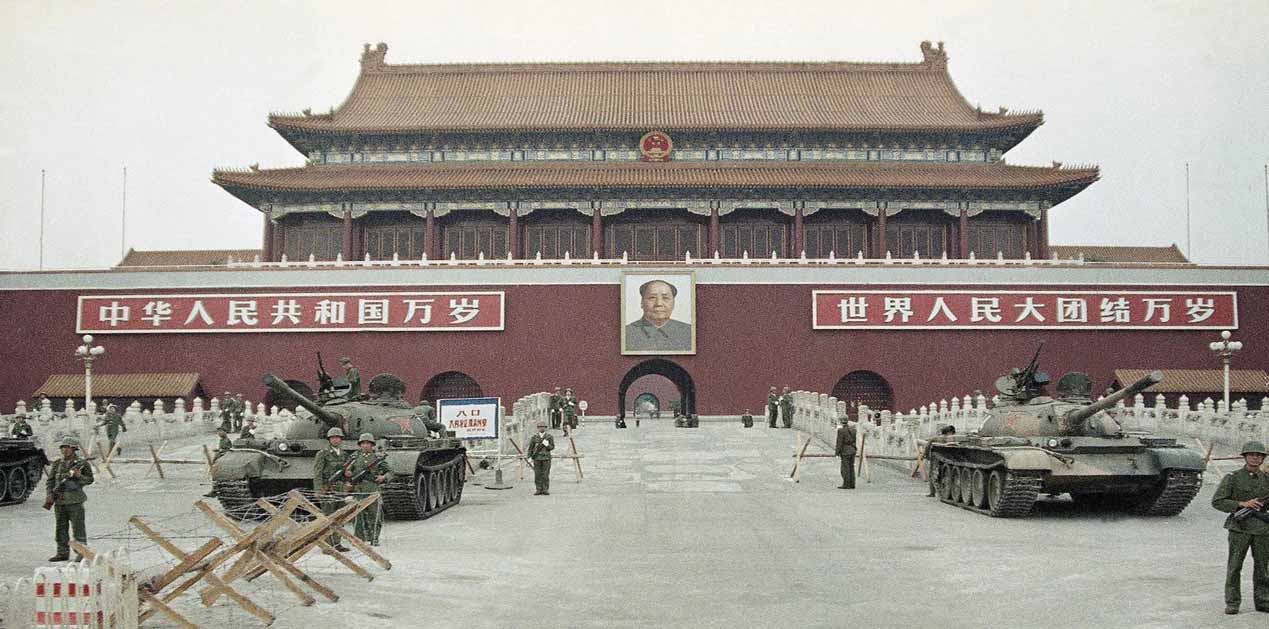The year 2019 is very special in the calendar of China as it marks some of the most important anniversaries. But the one anniversary which Beijing refuses to acknowledge is the thirty years since the Tiananmen Square Incident. On June 3 and 4, 1989 hundreds of students, workers and journalists had protested against the increasing corruption and made calls for a more democratic China.
Perceiving it as a threat to the stability of the Chinese government martial law was imposed and the only solution which Deng Xiaoping adopted was to use the People’ Liberation Army (PLA) to clear the grounds and silence the voice of the people. Even today the total death toll is still debatable and how many people actually died is still a mystery. Though the movement was forcibly silenced, the Chinese Communist Party (CCP) saw it as a major challenge to its legitimacy and credibility to rule. Since then the CCP has been very cautious and pro-active towards curtailing and preventing build-up of mass protests.
Though one cannot deny that the students’ protests had a major impact on the thinking and policy making of the CCP, it has never been accepted and acknowledged openly. The Chinese government mouthpiece Global Times published an article on June 4 titled Thirty years on, Chinese youth more confident of country's future. Even though the title of the article hints at the anniversary of the Tiananmen Square Incident, the main thrust of the article is that Chinese youth today have more confidence in the CCP and they are loyal to the Party.1 Loyalty is what the CCP needs in order to continue ruling China. The Chinese government under Xi Jinping is focussed on maintaining peace and stability at any cost.
It is also a known fact that prior to the anniversary the Chinese censorship intensity increases. There have been reports that the government censor internet searches that contain number 4 or 6 and the word June and Tiananmen. This same pattern was witnessed in 2019 as well. The anniversary is generally known as ‘internet maintenance day’ in China as most of the internet sites stop working.2 However, with the advances made in the artificial intelligence and other surveillance technologies it has become easier for the government to strengthen control. As of 2019, the extent of control is not limited to Chinese mainland. Around 100 twitter accounts of some of the prominent critics and activists living outside China were also temporarily suspended.3 As a result of this there is a whole new generation of Chinese youth which has no clear understanding about the events of June 1989.
The remarks made by the United States Secretary of State, Mike Pompeo on the anniversary were met with harsh retort from the Chinese Embassy in Washington DC. Pompeo, while remembering and honouring the protestors had said, "the heroes of the Chinese people who bravely stood up thirty years ago in Tiananmen Square to demand their rights."4 In addition to this the Chinese Foreign Ministry issued a statement further attacking Pompeo’s statement. The statement basically argued that Chinese enemies will not succeed and they always try to, "maliciously attacks China's political system, denigrates the state of China's human rights and religious affairs, wantonly criticises China's Xinjiang policy and severely interferes in China's domestic affairs."5 Till date the government’s stance has been that the action was necessary and correct. The accepted factor is still western and outside conspiracy to unsettle China. Given the on-going trade war with the United States, such statements by Pompeo will be portrayed as attempts to undermine the China’s rise and its rightful place in the global order.
On the other hand, Hong Kong marks this anniversary every year. The activists organized a candle light vigil with 180,000 participants.6 Most of the participants of the protests are either in jail or living in exile. In spite of this while spending an evening at the Tiananmen Square on June 4, 2011 one could not ignore the constant vigil and the tight presence policemen in plain clothes. A clear attempt of the government to project that June 3 and 4 are just like any other day on the calendar.
Even after thirty years of Tiananmen Square Incident the Chinese government does not appear confident to allow an open debate and own up its actions before the Chinese people. It employs every tool at its disposal to restrict the history from being known to the current generation. After the 1989 Tiananmen Incident the Chinese government had adopted a mass patriotic education campaign which pushed and the fed the people with the ‘official history’. It also squeezed out any space for contradicting the government’s narratives. The fear of another Tiananmen is so deeply entrenched among the ruling class that they are ready to undertake every possible measure to prevent such an outcome. Here one can argue that in the last thirty years the Chinese government has evolved a very sophisticated system of control and monitoring. Xi has consistently reduced the freedom and space available to the civil society. The control over the media has also intensified, reducing the space for any form of protest. He has also been committed to anti-corruption drive in order to cleanse the image of the Party.
However, the question remains in case the CCP is again challenged with a similar situation can it undertake the same action? Given the rise of communication technologies and internet will it be able to again effectively suppress the spread of information? Can the Party be victorious again?
References
- “Thirty years on, Chinese youth more confident of country's future” Global Times, June 4, 2019 at http://www.globaltimes.cn/content/1153046.shtml, (accessed on June 4, 2019).
- “World marks 30 years since Tiananmen massacre as China censors all mention” CNN, June 4, 2019 at https://edition.cnn.com/2019/06/03/asia/tiananmen-june-4-china-censorship-intl/index.html, (accessed June 6, 2019).
- “Twitter Takes Down Accounts of China Dissidents Ahead of Tiananmen Anniversary” The New York Times, June 1, 2019 at https://www.nytimes.com/2019/06/01/business/twitter-china-tiananmen.html, (accessed June 6, 2019).
- “Pompeo's Tiananmen Square anniversary remarks draw fire from China” CBS News, June 4, 2019 at https://www.cbsnews.com/news/tiananmen-square-mike-pompeo-china-angry-rewritten-version-history-anniversary-today-2019-06-04/, (accessed June 6, 2019)
- “Pompeo's Tiananmen Square anniversary remarks draw fire from China” CBS News, June 4, 2019 at https://www.cbsnews.com/news/tiananmen-square-mike-pompeo-china-angry-rewritten-version-history-anniversary-today-2019-06-04/, (accessed June 6, 2019)
- “Beijing falls silent as tight security surrounds Tiananmen Square anniversary” The Guardian, June 4, 2019 at https://www.theguardian.com/world/2019/jun/04/tiananmen-china-hong-kong-vigil-anniversary, (accessed June 4, 2019).
Image Source: https://cms.qz.com/wp-content/uploads/2015/06/tiananmen-square-beijing-1989.jpg?quality=75&strip=all&w=1600&h=900









Post new comment